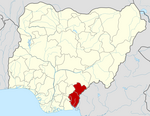Yala
Iyala | |
|---|---|
| Coordinates: 6°42′N 8°36′E / 6.700°N 8.600°E | |
| Country | |
| State | Cross River State |
| Government | |
| • Local Government Chairman | Fabian Odey-Ogbeche |
| Area | |
| • Total | 1,739 km2 (671 sq mi) |
| Population (2006 census) | |
| • Total | 210,843 |
| Time zone | UTC+1 ( WAT) |
| 3-digit postal code prefix | 550 |
| ISO 3166 code | NG.CR.YL |
| Website |
www |
|
| |
Yala is a Local Government Area in Cross River State, Nigeria. [1] Its headquarters is in the town of Okpoma in the east of the area at 6°35′35″N 8°38′01″E / 6.59306°N 8.63361°E.
It has an area of 1,739 km2 and a population of 210,843 at the 2006 census. [2] This makes Yala the second most populated LGA in Cross River State, coming after Akpabuyo.
The postal code of the area is 550. [3]
The dominant tribe in the Area are the Ukelle. Major settlements in Yala LGA include Okpoma, Okuku, Yahe, Ugaga, Ijegu, Oloko, Imaje, Oke, Echumoga, Woda, Ebo, Igede Edii Nation, Itekpa, Maa, Wonye, Uchu, Osina, Mbuor, Aliforkpa, Echumofana, Wanihem, Wanikade, Wanokom, Ijiraga, Mfuma, Ntrigom etc. Kukelle and Yala are the languages spoken by some inhabitants of Yalaland.
Other major tribes in Yala Local Government Area are, Igede-Edii (Anyadaha, Anyugbe, Eminyi, Ibilla, Igbakobor and Opiriku), Itekpa, Gabu, Ukelle and Yache. They speak Igede, Kukelle and Yache language respectively.
The LGA has abundant salt deposit which can sustain any small to medium scale salt industry. There are many salt ponds in Okpoma which are of great history to the people and are mined locally. The LGA also offers a wide range of investment opportunities in agro-based industries as well as solid mineral industries.[ citation needed]
History
The [4]Yala people are closely related to the Idoma people of Benue state, Nigeria and can understand their language. It is said that the Yala people left Benue state in search of salt, having found it in abundance in present day Yala, decided to stay. [5] The Ukelle people on the other hand are kins to the Orring people found in both Benue and Ebonyi state. These people are the Ufia (Utonkon pe [6]ople); Ntezi, Effium, Okpoto, Amuda and Okpolo people respectively. [7]
Economy
The people of Yala are historically and predominantly subsistence farmers and traders. They cultivate white yams, water yam, black yam and cassava as main crops for home consumption and sell the surplus in the village market. They also plant other crops like bambara nuts, groundnuts, sesame, maize and some local legumes, e.g. igigri.
Animal rearing is also mainly subsistence even though chicken and catfish farming are becoming increasingly important. Broilers and layers are in high demand. A few people rear native cows, which are smallish in size and prized for traditional celebrations and funerals.
A large number of Yala people are also involved in petty trading as well as running one shop supermarkets.
A major obstacle to economic activities for Yala people is the bad roads, both federal and state. The bad state of disrepair of the roads leads to fast depreciation of motorcycles, the main medium of transport. Dust from the roads causes respiratory illnesses and contaminated garri. Yet the people of Yala are resilient, carrying on their lives as best as they can.
See also
Cross River State In Yala local government area, there is an ongoing construction of a rice industry, located on a land mass from between Okuku heading towards Igoli road through the Army Barracks. There is a roofing tiles factory in Yala. [8] The Yala people are predominantly farmers, civil servants, and law enforcement officers. A significant number of the youths work as traders, craftsmen and commercial motorcyclists.
In Yala, the most celebrated agricultural produce is the yam. An entire day is declared as a holiday to celebrate the yam every new harvest time which is usually on the 30th of August annually. This sees Yala people from all around the world return home to enjoy a cultural heritage festival and Holiday.
References
- ^ "About Yala Local Government". Cross River Hub. Retrieved 2024-03-29.
- ^ Simon O. Ering (2010). "The Population Situation in Cross River State of Nigeria and Its Implication for Socio-Economic Development: Observations from the 1991 and 2006 Censuses" (PDF).
- ^ "Post Offices- with map of LGA". NIPOST. Retrieved 2009-10-20.
- ^ Yala people are inhabitants of the salt river area of northern Cross River, they are predominantly farmers, hunters and traders.
- ^ "Idoma People of Yala Land | IdomaLand". www.idomaland.org. 2020-07-08. Retrieved 2024-01-30.
- ^ Nkamigbo, Lc (2013-01-21). "Lexicostratigraphy: Tracing Geographical Location and Linguistic Change in Koring". OGIRISI: a New Journal of African Studies. 9 (1): 116. doi: 10.4314/og.v9i1.6. ISSN 1597-474X.
- ^ Alagoa, Ebiegberi Joe; Anozie, Frederick N.; Nzewunwa, Nwanna (1988). The Early history of the Niger delta. Sprache und Geschichte in Afrika. Hamburg: H. Buske. ISBN 978-3-87118-848-0.
- ^ "Cross River test-runs tile factory - The Nation Newspaper". Archived from the original on 2020-01-08.
4. "We Are Idomas And Not Cross Riverians; Yala People" http://www.iambenue.com/we-are-idomas-and-not-cross-riverians-yala-people/

